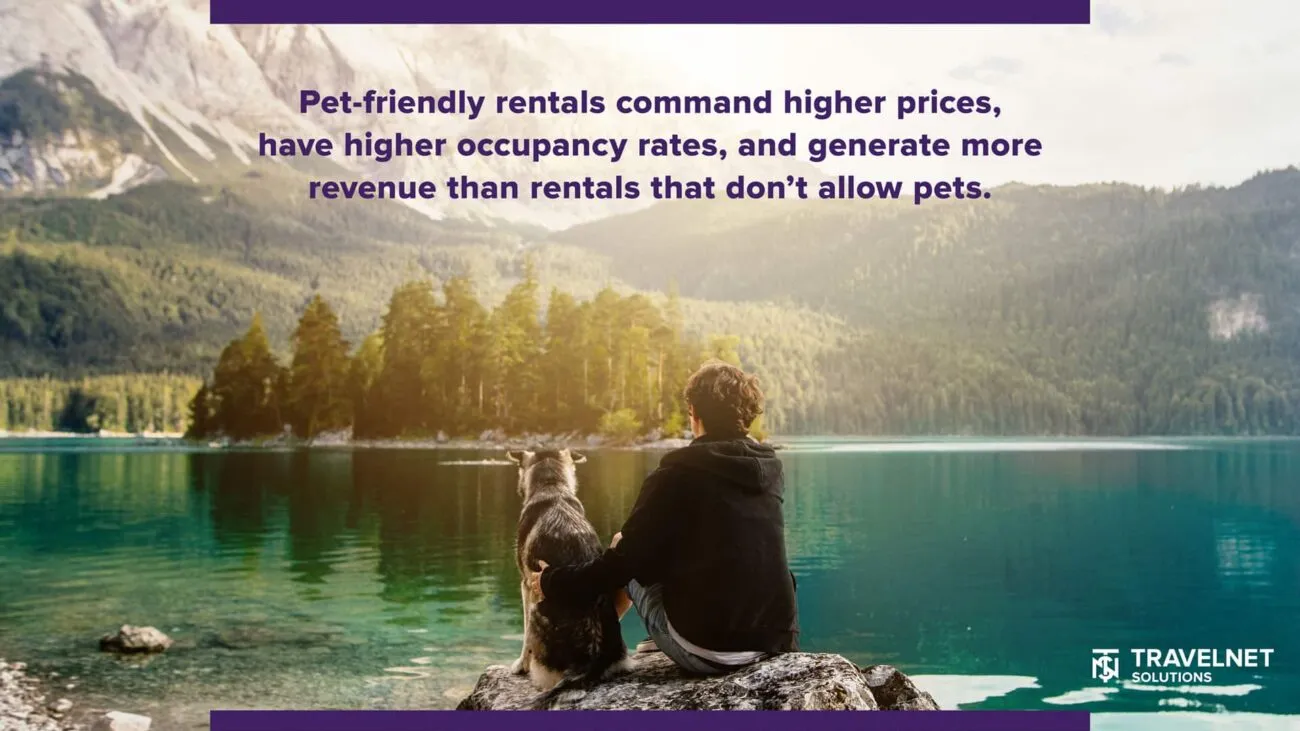Preparing Properties for Pets: The Lowdown (Part 2 of 2)

Pets guests aren’t something you just shoo in the door and forget about. A lot goes into preparing properties to receive them. You’re always going to be balancing your investment to accommodate the furry nonhumans with your ROI. You’ll also be balancing the upkeep required against the safety and comfort of humans and animals alike. It can be a tricky slope, but we’re prepared to lead you comfortably through the hurdles you may encounter.
If you haven’t read Part 1 of this series,”Pets Allowed: Do you want them? Will they pay?” start here.
First, determine your rates.
Once you decide to accept pets, determining your rates needs a studied approach. You’ll have to figure in the risk of damage (furniture, carpets, bedding) along with added cleaning costs. It’s interesting to note how hotels price pet stays: some charge more for longer stays, some charge by the number of animals (check out this report). There are still hotels where pets can stay free, but their numbers are dwindling. Occasionally hotels charge a pet deposit.
When setting your fees, also consider the size of the animal, but don’t be fooled: sometimes tiny dogs can carry big-dog energy (check out this revealing list). Also, consider the extra time and effort needed to clean pet hair off the furniture, prints off the glass, and poop from the yard. You may also want to de-infest after each stay.
On booking platforms, nightly rates are usually separate from cleaning fees. You may need to raise both.
To manage setting the right price for your region, Track customers, via Rented, have the benefit of its dynamic pricing tools as well as the expertise of digital strategists who can help you make these decisions faster and more efficiently.
Pet-Proof Your Property
Pet owners want to know their rental is safe for their furry companion. And you want to know your property is safe against them! Some tips:
- Damage-proof. To cut down on damage, use durable and pet-friendly materials such as tile and laminate flooring and leather or microfiber upholstery—all less resistant to scratches, stains, and pet odors.
- Hazard-proof. Clear away potential hazards like toxic plants and chemicals—both indoors and out.
- Safety. Install pet gates indoors and fences outdoors to deter straying.
- Cleaning. Keep guests supplied with pet-friendly cleaning supplies, such as pet stain removers, lint rollers, and waste bags.
- Maintenance. Regularly inspect your property to identify any pet damage and ensure repairs promptly.
Rack Up Those Pet Amenities
Once you’re all in, developing your list of pet-centric amenities is not only fun; it can be a way to brand your property and get more attention. And that’s because present-day pet-friendly properties are outdoing themselves in pampering pets.
For instance, Best Friend Roadhouse and Mercantile, near the Utah and Arizona national parks, offer built-in doggy beds! Some Loews properties offer a room service menu especially designed for dogs and cats, plus leashes, collars, litter boxes, scoopers, place mats, and water bowls. The Clancy in San Francisco offers a doggy robe! You don’t have to go that far, but basics like water and food bowls should be considered the bare minimum.
Dog beds (with changeable covers) are appreciated and you might consider a basket by the door filled with old towels to wipe down dirty paws.
Special treats and toys are always popular (ask the guest ahead of time what their pet likes).
Even welcoming the pet on arrival by name (“Hey, Rufus!”) will go a long way to ensuring the loyalty of the one paying the bill!
Fortunately, Track Hospitality Software makes it simple to keep track of names, likes, and needs for future visits.
Do leave your guests a list of local vets and pet service providers in your neighborhood. If you’re in the mood, create a special booklet denoting dog-friendly trails and amusements in your neighborhood.
If you want to remind your guests (subtly) of their cleaning responsibilities, write a warm welcome note addressed to said pet with reminders of how to clean up after its stay!
Marketing Your Pet Program
Hopefully, you’ve already branded your property with a name. So why not add a branded pet program, like Shelly’s Chalet’s ‘We Love Your Pet’ program? You can advertise it on your website homepage with a link to your special pet amenities and policies, and, of course, post the info throughout your OTA listings.
Having a branded program which reflects your commitment to pet owners spreads the love and might even catch the interest of travel journalists writing about your area.
Not to mention, social media was made for pet photos! What better endorsement of your pet-loving property than to feature a beaming guest-with-furball sitting on your porch steps. Or, throwing a Frisbee in your backyard, with your swimming pool featured in the background. You could even create a Best Guest Pet contest that encourages your followers to interact on social media. However you make them happy, know that satisfied pet-owning guests are delighted to leave positive reviews on OTAs.
There’s nothing better to raise your profile than a glowing endorsement from one pet lover to another.
Leverage Partnerships
One of the advantages of creating a pet-promoting property is leveraging partnerships in your community. It not only widens your credibility; it creates a support system that will no doubt come in handy. Reach out to vet and animal emergency clinics in your area to see if your guests can get a promotion. Regional pet food stores may also offer a discount to travelers.
Among the 4,600 pet-friendly Hilton hotels (about 85 percent), some are linked to Mars Pet On-Demand, a free virtual support hotline where travelers can receive wellness advice for their traveling cats and dogs.
Virgin’s first hotel in New York City offers treats from Shameless Pets, a company that upcycles leftover food into treats; maybe a local restaurant will partner with you. (Should we even mention Virgin’s canine guests also receive a branded dog bandana?!)
Kimpton hotels offer a partnership with Wag!, a mobile-first platform that connects pet parents with professional pet caregivers for walking, drop-in visits, and pet sitting.
Marriott’s Home & Villas, a booking partner of Travelnet Solutions, have now teamed up with Petco Health = Wellness Company. Users of the H&V site are now able to browse “Pet-Friendly Picks by Petco” and find properties that are near walking/hiking trails or pet-friendly beaches. Some may also offer kennels, bedding, toys, and treats. The site is worth checking out if only to see the types of home rentals that get the OTA stamp of approval.
Policy and Insurance Issues
A pet policy is your opportunity to explain in detail exactly what you expect from guests with pets. And it’s critical you post it on your website and booking platforms. To write a policy, first consider the type of pets you’re willing to accept: size, age, weight limit, breeds, spayed/neutered, number, vaccinated, and/or flea and tick controlled.
Also, think through every step your pet guest might take—from indoors to out. For example, if you’re on the beach, a dog will likely drag sand into the house unless their paws are washed before entering. Clearly communicate your expectations both for cleanliness and behavioral management, and outline guidelines for guests to follow, such as cleaning up pet hair or disposing of waste properly.
Allowing pets on your property may increase the risk of liability for the property owner. If a pet bites or injures someone on the premises, the owner may be held responsible. Check to see what your insurance covers; some policies may require additional coverage for properties that allow pets, or special breeds.
Also, be aware of local ordinance and Homeowner Association policies regarding pet waste cleanup, leashing, and barking in your neighborhood. Your guests will appreciate knowing the rules in advance before they step into trouble.
Summing Up
If you’re still interested in fostering a pet-welcoming property, it must be because you yourself are a dedicated pet lover! You understand what pet owners need and you care whether their furry beloveds stay safe and happy. Of course, you don’t have to go as far as the owner of IHG Kimpton boutique hotels (clearly a pet owner himself) who accepts any pet that “fits through the door, whether they are furry, feathery or scaly, no matter their size, weight, or breed” and at no extra charge!
No, your business is to make sure your pet guests are profitable—both in the short and long term. By pricing effectively, by clearly stating your policy, and by preparing your property in the best pet-proof way, you can gain the best of both worlds—the joy of meeting your guests’ extended family and the confidence that your property will stay safe and sound—all year long.
To learn how Track can help you through the highs and lows of pet guesting, as well as 360-degree management support, book a demo.



